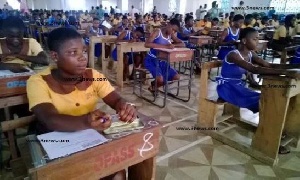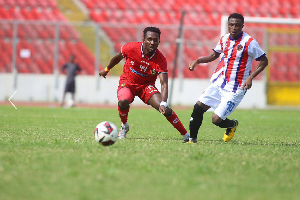The poor results produced in the past ten years by pupils who sat for the Basic Education Certificate Examination (BECE) in the Northern, Upper East and Upper West regions have been a source of worry to stakeholders in the area.
For the 10 year period, the regional league table rankings have shown that the three regions have been competing for the three worst positions – eighth, ninth and tenth out of the ten regions.
The falling standards of education in these regions can no longer be swept under the carpet as the league table for academic year keeps revealing the abysmal performances of students in this part of the country. The Northern region had its pass mark pegged at 48 percent in 2016, below the national percentage of 50. The three regions have only progressed rotationally from eighth to tenth positions.
Teacher and students absenteeism, cultural practices are among factors blamed for the abysmal performances especially in the rural communities where distance and roles assigned girls by culture hampers their progress to tertiary level.
According to the Northern Regional Education Director Alhaji Haroon Cambodia, the best some teachers do is to waste over half of the teaching periods idling while pupils play thereby not being able to finish their syllabus before the end of the academic year.
Worst still, the director reveals that most students do not even show up in school when they progressed to JHS3, thinking they are almost done with their education.
“Teacher absenteeism is the major cause in the rural areas because if the teacher doesn’t attend school, how does he teach? There is something called time on task in education, if I have been given twenty four periods to teach in a week but teach only twelve or six periods, the remaining lost is what will cause the student to fail because if I have to follow what I have been asked to do then I can cover the syllabus but if the teacher decides not to go to school or sometimes even go to school and sit under a tree and refuse to teach, that teacher will not meet the time on task”.
He added some teachers may be present in school but will waste the entire period sitting under trees, “they go to school and do not teacher which is now known as “teacher presenteeism” an act where teachers are present in school but waste more than half of the teaching period idling.
Alhaji Haroon Cambodia is worried the trend heavily affects girls as girls enrolment reduces as they progress to the junior high school and becomes worse after the basic education certificate examination.
The low performance at the BECE level directly affects the number of students who are admitted into the second cycle institution especially girls.
“The low performance during the BECE level directly affects the number of students who are admitted into the pre-tertiary institution especially girls so if you look at the educational ladder of the Northern region, it is like a triangle, at the primary school we have a lot of them, when they get to the junior high school some drop out from the basic school but more even drop out at the junior high school because of the low performance in the BECE exams and therefore they are not able to go to senior high schools.
That of the girls is more disheartening because they are the worst affected, they drop out after junior high school due to some cultural and social practices that prevent the them from progressing to senior high schools”. The unwillingness of teachers taking up courses in core subjects is also having a toll on the performances, something that hinders effective teaching and learning.
Alhaji Haroon Cambodia reveals a research conducted by him among teachers some years ago indicated “the region also lacks teachers to handle the core subjects as teachers are unwilling to further their education in the core subjects”.
The worried director opined that a total stakeholder participation where the PTA, SMC, Education Units, District Assemblies assume their roles in ensuring a complete adherence to the educational roles will witness a change in the trend. The Tolon district education director, Rev Mrs Georgina Anaba-Nuagah also blames lack of parental supervision after school’s hours for the low performances.
He said most students hook on to their phones immediately after school. Even in classrooms, some students have been caught watching pornographic materials. “Pupils come to school with mobile phones and watch pornographic materials even during lesson hours.
Parents seem not to bother about this phenomenon where they are aware they did not buy the phones for their wards yet do not trace the source and deal with it. Parents here do not attend PTA meetings, some do not even know the schools and have never visited to inquire from teachers how their wards are faring academically, so how do you expect them to pass when you don’t show concern,” she quizzed?
These concerns were raised during a stakeholders’ meeting organized by the Youth Empowerment for Life in Tamale.
Though the youth have been referred to as the future leaders, YEFL observed that they lack the foundation at the basic level which will serve as the catalyst for good leadership.
The Youth Empowerment for Life also reveals hopelessness of the youth in the education system, especially BECE candidates hence the need to engage leadership of the youth groups.
The proposed suggestions tabled down during the meeting will be forwarded to the planning office of the regional coordinating council to be considered for the medium and long term development plans of the various districts, said the project officer of Youth Empowerment for Life Clement Boateng. “The issues we have realized can be addressed on various platforms and one of this is beginning the process of ensuring that these suggestions are factored into the medium term development plan of the various plans.
We also plan to create a platform where we will have both the youth leaders and duty bearers which will serve as a monitoring tool where the youth can channel any observation for immediate solution because we have teachers who just sit under tress during classes hours and this among other issues can be resolved only by effective monitoring”.
General News of Tuesday, 13 June 2017
Source: 3news.com

















